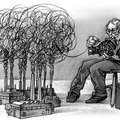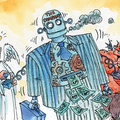Probably—but not in the way many foreigners (and some Americans) hope
| |
 | |
FOR George Bush, the presidency is becoming a tragic tale of unintended consequences. In foreign policy, the man who sought to transform Iraq, the Middle East and America's reputation has indeed had revolutionary effects, though not the ones he was aiming for. Now something similar seems to be happening in domestic politics. The most conservative president in recent history, a man who sought to turn his victories of 2000 and 2004 into a Republican hegemony, may well end up driving the Western world's most impressive political machine off a cliff.
That machine has put Republicans in the White House in seven of the past ten contests. At times it has seemed as if the Democrats (oddly, given their status as the less Godly party) have had to rely on divine intervention to get elected. Watergate helped Jimmy Carter in 1976, just as the end of the cold war and Ross Perot's disruptive third-party campaign helped Bill Clinton in 1992. Better organised and more intellectually inventive than their “liberal” rivals, American conservatives have controlled the agenda even when they have lost: Mr Clinton is best remembered for balancing the budget and passing welfare reform, both conservative achievements. In a country where one in three people see themselves as conservatives (against one in five as liberals) and where the South and West have grown far more quickly than the liberal north-east, it is easy to see why Mr Bush and his strategist, Karl Rove, dreamed of banishing Democrats from power for a generation.
Now they would settle for a lot less. Having recaptured Congress last year, the Democrats are on course to retake the presidency in 2008. Only one Republican, Rudy Giuliani, looks competitive in the polls, and his campaign is less slick than those of Hillary Clinton and Barack Obama. Voters now favour generic Democratic candidates over Republican ones by wide margins. Democrats are more trusted even on traditional conservative issues, such as national security, and they have opened up a wide gap among the young, among independents and among Latinos (see article).
The easy scapegoat is Mr Bush himself. During his presidency, the words Katrina, Rumsfeld, Abramoff, Guantánamo and Libby have become shorthand for incompetence, cronyism or extremism. Indeed, the failings of Mr Bush's coterie are oddly reassuring for some conservatives: once he has gone, they can regroup, as they did after his father was ousted in 1992.
Yet this President Bush is not a good scapegoat. Rather than betraying the right, he has given it virtually everything it craved, from humongous tax cuts to conservative judges. Many of the worst errors were championed by conservative constituencies. Some of the arrogance in foreign policy stems from the armchair warriors of neoconservatism; the ill-fated attempt to “save” the life of the severely brain-damaged Terri Schiavo was driven by the Christian right. Even Mr Bush's apparently oxymoronic trust in “big-government conservatism” is shared in practice by most Republicans in Congress.
From this perspective, the worrying parallel for the right is not 1992 but the liberal overreach of the 1960s. By embracing leftish causes that were too extreme for the American mainstream—from unfettered abortion to affirmative action—the Democrats cast themselves into the political wilderness. Now the American people seem to be reacting to conservative over-reach by turning left. More want universal health insurance; more distrust force as a way to bring about peace; more like greenery; ever more dislike intolerance on social issues.
So some sort of shift seems to be under way. Would it be a change for the better? The Economist has never made any secret of its preference for the Republican Party's individualistic “western” wing rather than the moralistic “southern” one that Mr Bush has come to typify. It is hard to imagine Ronald Reagan sponsoring a federal amendment banning gay marriage or limiting federal funding for stem-cell research. Yet Mr Bush's departure hardly guarantees a move back to the centre. Social liberals like Mr Giuliani and Arnold Schwarzenegger are in a minority on the right. On the one issue where Mr Bush fought the intolerant wing of his party, immigration, the nativists won—and perhaps lost the Latino vote for a generation.
In terms of foreign policy, America's allies, especially in Europe, would also be unwise to start celebrating, for two reasons. First, some of the changes that would stem from a more Democratic America would be unwelcome. The Democrats are moving to the left not just on health care, but also on trade; and a more protectionist America would soon make the world's poor regret Mr Bush's passing. Similarly, many Europeans may yearn for a less interventionist America; but an isolationist superpower could be much more frightening.
Second, America, even if it shifts to the left, will still be a conservative force on the international stage. Mrs Clinton might be portrayed as a communist on talk radio in Kansas, but set her alongside France's Nicolas Sarkozy, Germany's Angela Merkel, Britain's David Cameron or any other supposed European conservative, and on virtually every significant issue Mrs Clinton is the more right-wing. She also mentions God more often than the average European bishop. As for foreign policy, the main Democratic candidates are equally staunch in their support of Israel; none of them has ruled out attacking Iran; Mr Obama might take a shot at Pakistan; and few of them want to cede power to multilateral organisations.
One finding that stands out in the polls is that most Americans distrust government strongly. Forty years ago they turned against a leftish elite trying to boss them around; now they have had to endure a right-wing version. In democracies political revolutions usually become obvious only in retrospect. In 1968, with America stuck in another bruising war, few liberals saw Richard Nixon's southern strategy as part of a long-term turn to the right. All that was clear then was that most Americans urgently wanted a change of direction. That is also true today.





